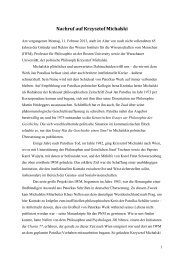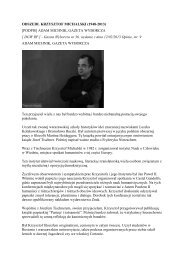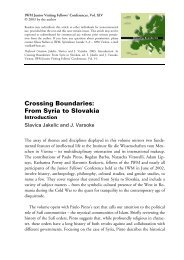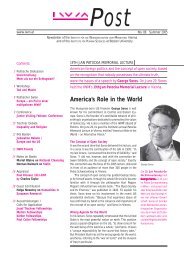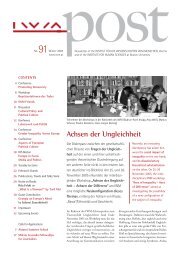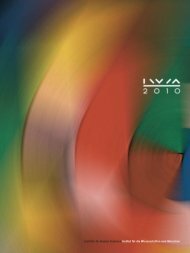Questionable Returns: Introduction - IWM
Questionable Returns: Introduction - IWM
Questionable Returns: Introduction - IWM
Create successful ePaper yourself
Turn your PDF publications into a flip-book with our unique Google optimized e-Paper software.
ANDREW BOVE: INTRODUCTION 3<br />
The journal is organized into five parts, each of which consists of a pair of articles<br />
on related themes or topics. Part one contains papers on two very definite political<br />
transformations in Central and Eastern Europe. Michal Kopecek discusses, from<br />
the Czech standpoint, the rise and fall of the so-called Visegrád cooperation<br />
amongst four Central European states. He traces the origins of the debate – which<br />
began in earnest in the 1980s with the publication of a seminal essay by Milan<br />
Kundera – over whether Central Europe constitutes a discrete civilization. Kopecek’s<br />
objects are the idea of a “return to Europe” which animated Czech politics in<br />
the years following the Velvet Revolution and the political debates surrounding this<br />
idea. Recounting the “row of the two Václavs” that was of crucial importance in the<br />
reconstitution of Czech politics after 1989, he shows how the “realism” of Klaus<br />
came to prevail over the “idealism” of Havel, and why in the Czech Republic the<br />
so-called return to Europe has been much more a matter of pragmatic negotiation<br />
than recovery of a buried identity.<br />
Tatiana Zhurzhenko’s topic is language politics in contemporary Ukraine, specifically,<br />
debates over the status of the Ukrainian and Russian languages in the new<br />
state. She gives a brief political-linguistic history of Ukraine from the 19 th Century<br />
to the present, followed by a discussion of the dynamics of Ukrainian’s return as an<br />
official state language. Utilizing both empirical data and recent theory on the rights<br />
of linguistic minorities, Zhurzhenko argues that the task of Ukrainian nationbuilding<br />
today calls for a moderate multicultural approach to “the language issue,”<br />
one guided by prudence and political justice and not linguistic or ethnic revanchism.<br />
Kopecek and Zhurzhenko teach us much about how the revolutions in the<br />
East call for careful balancing of past and future.<br />
In part two, Inna Naletova and Julia Huang discuss two distinct religious<br />
movements. Using recent sociological data, Naletova analyzes the status and influence<br />
of the Orthodox Church in contemporary Russia. Her main question is<br />
whether or not a Church revival is underway, and she thinks the evidence suggests<br />
an affirmative answer. But this presents a problem, for post-Communist Russia is a<br />
modern country where a simple return to the pre-revolutionary bond between<br />
church and state is highly unlikely or impossible. On the other hand, Naletova suggests<br />
that the Church might play a valuable role in Russia’s future by helping restore<br />
civic purpose and checking the libertarian excesses of Western liberalism and<br />
capitalism. In any case, the Church seems fated to endure alongside liberalism in<br />
future Russian society, and Naletova makes a strong case for the importance of<br />
practical reflection and systematic research on the relation between the two.



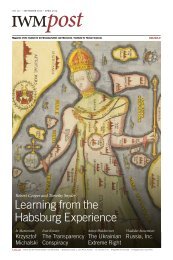
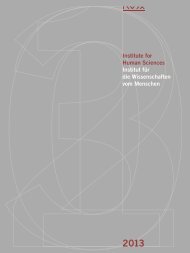
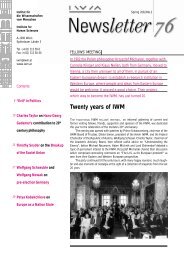
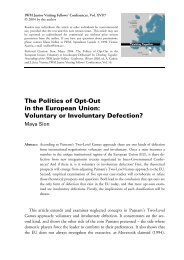
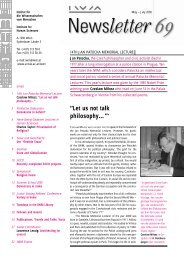
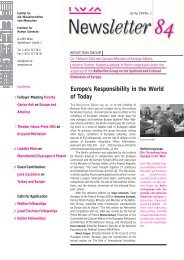
![POSZUKIWAÅ PRAWDY I ZABAWY [PODPIS] PROF ... - IWM](https://img.yumpu.com/23611273/1/184x260/poszukiwaa-prawdy-i-zabawy-podpis-prof-iwm.jpg?quality=85)
